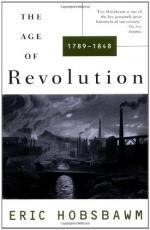
|
| Name: _________________________ | Period: ___________________ |
This test consists of 5 multiple choice questions, 5 short answer questions, and 10 short essay questions.
Multiple Choice Questions
1. What was the result of improvements in the technology of spinning and weaving?
(a) Increased tax revenue from the cotton trade.
(b) Increased output.
(c) Decreased farm size.
(d) Decreased need for labor.
2. Why did the international congress among Europe's ruling nations dissolve after a few years?
(a) It was replaced by another alliance.
(b) The interests of its main powers diverged.
(c) Its members launched an unsuccessful war together.
(d) Its members conspired against each other.
3. Where does Hobsbawm see a culture combining nationalism with the revolutionary spirit of the French Revolution?
(a) Greece.
(b) Ireland.
(c) Albania.
(d) Poland.
4. What was the Bastille a symbol of when the French stormed it in 1789?
(a) The radical element.
(b) The monarchy.
(c) The free market.
(d) The bourgeoisie.
5. Who does Hobsbawm say rose to prominence financing the wars?
(a) The Rockefellers.
(b) The Jews.
(c) Swiss.
(d) The Barings and Rothschilds.
Short Answer Questions
1. Where does Hobsbawm say the first wave of revolutions took place after the French Revolution?
2. What did the French Revolution demonstrate to the rest of Europe?
3. What does Hobsbawm say the major European powers agreed on after the French Revolution?
4. In what way does Hobsbawm say the world was smaller in 1789?
5. The merchant class was situated between what and what, in Hobsbawm's account?
Short Essay Questions
1. Describe Robespierre's influence on the French Revolution.
2. Why does Hobsbawm say that raw materials like iron and coal did not expand the same way as cotton began to expand in the 1780s?
3. What was the importance of railroads, in Hobsbawm's account, in the Industrial Revolution?
4. How does Hobsbawm say that the nationalistic ideal spread through Europe?
5. What does Hobsbawm say was the third wave of revolutions to follow the French Revolution?
6. What does Hobsbawm say is the difference between revolts and national movements?
7. What was the effect, in Hobsbawm's account, of the American Revolution on the French Revolution?
8. In what way does Hobsbawm say that the world was both bigger and smaller in the late 1700s?
9. What conditions made Britain ripe for the Industrial Revolution, according to Hobsbawm?
10. What role did the cotton market play in the Industrial Revolution, in Hobsbawm's account?
|
This section contains 836 words (approx. 3 pages at 300 words per page) |

|




